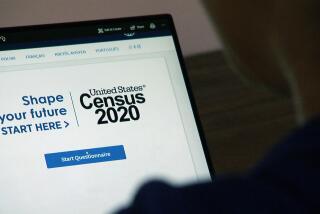Everyone Counts
- Share via
The original and major purpose of the U.S. Census was to apportion membership in the House of Representatives among the various states. The 14th Amendment to the Constitution provides that the seats be distributed on the basis of the “whole number of persons” in each state. The census was not supposed to count just citizens of the United States or registered voters, but everyone. That is the way it should be now, and the way it will be in 1990 provided that Congress upholds the position of the House on a controversial census issue.
The Senate voted 50-41 two weeks ago to exclude illegal immigrants from the national population count. On Wednesday, the House, by a vote of 232-184, refused to attach such a provision to the Commerce Department appropriations bill. The issue is being joined again, however, in the Senate-House conference committee appointed to reconcile differences in the two versions of the legislation. Congress should stick with the traditional method followed by the Census Bureau and count everyone.
The drive to exclude the illegals from the census was, understandably, led by members of Congress from states that stand to lose seats during the post-1990 census reapportionment of the 435 House seats. The illegal population, thought to be between 1.7 million and 2.9 million, is concentrated heavily in California, Texas and New York. California and Texas are among the states that will gain House seats following the census, with California getting five to seven new districts.
Washington insiders note that the Senate usually yields to the House on redistricting issues and is likely to give up its illegal immigrant amendment. That is the proper course to take, not just from the standpoint of California political clout to be gained, but as a matter of tradition and equity. Census figures are important to states and cities for a variety of other reasons. Funds from many federal programs are allocated on the basis of population. And while they may not be citizens, illegals qualify for assistance under some of those programs. Without a proper federal census count, the state and local governments would have to absorb such costs.
A complete count is important for another reason: Many poor people and members of minority groups--transients and street people, for instance--are passed over during the decennial census. Many of the larger cities have been undercounted by a substantial number in past censuses. Federal officials estimate that as many as 10% of U.S. Latinos were missed in the 1980 census. A decision not to count illegals almost certainly would make the undercount worse.
A proponent of the failed House amendment claimed that illegals should not be counted because they are not entitled to political representation in the House. That is a cramped view of what American democracy is all about. One might as well argue that only those people who voted were entitled to representation. Or only those who voted for the winning candidate. In fact, members of the House of Representatives are morally obligated to represent their entire district, not just select groups. But first, everyone must be counted.
More to Read
Get the L.A. Times Politics newsletter
Deeply reported insights into legislation, politics and policy from Sacramento, Washington and beyond. In your inbox twice per week.
You may occasionally receive promotional content from the Los Angeles Times.










